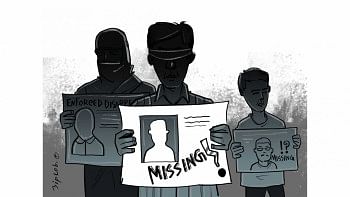Navigating Bangladesh’s crossroads

Human nature has an innate tendency to escalate demands once an initial concession is made, and thus, the saying goes "If you let someone sit, he wants to eat; if you let him eat, he wants to sleep". This adage holds significant relevance to the recent events in the political arena in Bangladesh after August 5. While the appointment of an interim government led by the esteemed Professor Muhammad Yunus has sparked a wave of public optimism, it has also encouraged certain groups within society to push for their own interests, with the potential to destabilising the government and, in the process, jeopardising the collective dream of a better Bangladesh.
At present, Bangladesh is undoubtedly at a critical juncture. The political corruption, financial irregularities, nepotism and all possible governance irregularities of the past 15 years have eroded public trust in the government. The interim government has been swift in making crucial changes, appointing competent individuals with a clean image to key positions in the government, earning widespread approval, as it signals a move towards transparency and accountability.
However, the road ahead is marred with potholes, as the country is wrestling with countless crises left behind by a corrupt despot: a struggling banking sector, a volatile capital market, dwindling foreign exchange reserves, rising inflation, and an ongoing energy crisis. Additionally, low foreign direct investment (FDI) as a result of the high cost and struggles of doing business in Bangladesh, rampant corruption, strained relations with neighbouring countries, and natural disasters like unexpected floods further complicate the situation.
It is imperative to know who is backing these impatient factions surfacing with all kinds of demands now after remaining silent for decades and playing no role in the student-led movement. In my recent article, "Beneficiaries in a Crisis", I highlighted these issues, foreseeing their advent. There are various theories suggesting a third force backing this group. It is crucial for the government to remain hawk-eyed and ensure that these opportunists do not jeopardise the hard-earned freedom of the people. When the right people unite for a good cause, as in the case of the interim government, any challenge can transform into opportunities.
Now, the question is how the interim government can work together with citizens to navigate these challenges. The answer lies in learning from countries that have faced similar situations and adopting best practices that have proven effective. While each nation's context is unique, valuable lessons can still be drawn from their experiences.
South Korea's shift from dictatorship to democracy in the late 1980s highlights the role of an interim government in ensuring transparency and engaging civil society. Establishing independent bodies, like an anti-corruption agency, restored trust and stabilised the economy—an approach our interim government can adopt for key sectors like banking, energy and judiciary.
Tunisia's post-Arab Spring transition emphasised dialogue and inclusivity, uniting political factions and civil society to draft a widely supported constitution. This approach prevented polarisation and secured broad support. Bangladesh's interim government should similarly engage all stakeholders, including civil society and business, to build consensus on the nation's future direction.
Rwanda's post-genocide recovery focused on economic reforms and fighting corruption, streamlining business regulations, investing in infrastructure, and enforcing strict laws. These efforts attracted foreign investment, spurring rapid growth. Bangladesh can emulate this by simplifying regulations, improving infrastructure, and combating corruption to boost economic growth.
Given the current severity of socio-economic challenges, it is crucial for political parties to allow the interim government to address these issues effectively. The interim government is positioned to tackle these challenges in ways that a political government may not be able to do so.
The success of the interim government depends not only on its ability to implement reforms but also on public support. As citizens, it is crucial to exercise patience and avoid making unreasonable demands that could derail the government's efforts. Bangladesh's problems today did not emerge overnight, and neither will the solutions.
The author is the founder and managing director of BuildCon Consultancies Ltd


 For all latest news, follow The Daily Star's Google News channel.
For all latest news, follow The Daily Star's Google News channel. 



Comments